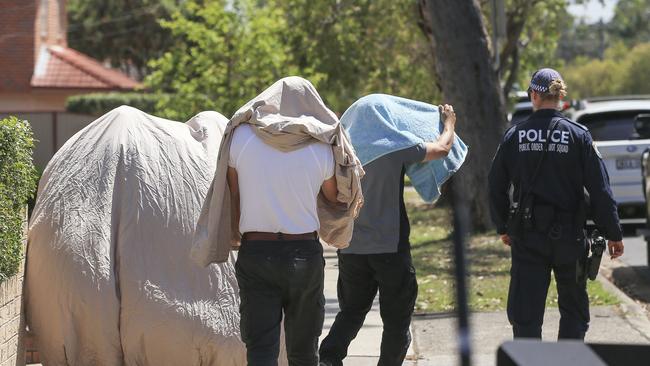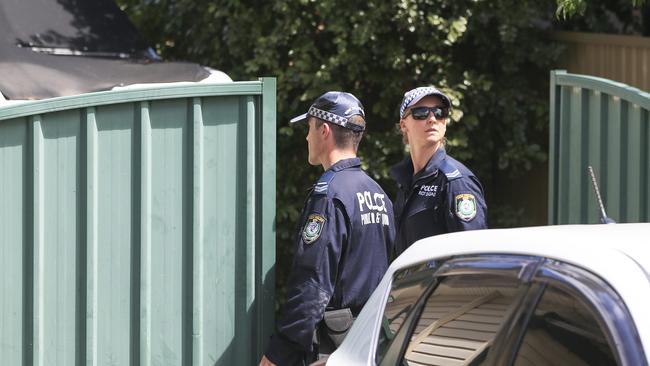Inside the police raids that brought down a $17m Sydney money laundering syndicate
They were unsophisticated and light on security, from modest backgrounds and hardly living like crime kingpins — but a court would find a Western Sydney group laundered $17 million in just a few months as part of a shadowy criminal network from a cramped apartment in Bankstown.
True Crime
Don't miss out on the headlines from True Crime. Followed categories will be added to My News.
- Man accused of depositing bundles of up to $10,000
- Cryptic clues emerge as virus suspends William Tyrrell inquest
Behind the metal security and heavy timber doors of Elamira-Zahira Elayouby’s Bankstown apartment police found a locked room even she couldn’t get into.
Inside was a money counting machine, bank deposit slips and bags stuffed with cash — it was just the tip of a $17 million iceberg.
“We got robbed, we got robbed,” listening devices captured Elayouby saying on the phone when she returned home and found it ransacked on October 23, 2017.
She didn’t realise it had been a covert police unit, not thieves, that had made off with more than $1 million in cash.

Fouad Moussa arrived with another man. Elayouby was told not to call the police.
Instead she called real estate agents to organise a new safe house that met “specific security requirements”.
Judge Dina Yehia SC last week detailed the money laundering syndicate while sentencing Elayouby, Moussa and barber Ahmad Ali in the NSW District Court.

Each had pleaded guilty to dealing with money intending that it would become an instrument of crime.
The judgment, published by the court, does not reveal the shadowy figures who were directing the trio or where the money came from.
But the court heard the “amateurish” syndicate funnelled more than $17 million through 2932 bank deposits between April and October 2017.
Many of the deposits were reconciled at Ali’s barber shop and police prosecutors argued it was a meeting point for the syndicate.
In April, Elayouby had been directed to register a HiAce van in her own name.
The court would find it was used to transfer the massive amounts of money.
The day after the covert raid, Moussa told Elayouby to apply for new registration plates for the van to “confuse surveillance and reduce the chances of detection”, the judge said in her decision.
But it wouldn't help — the following day police conducted a full raid on the unit and seized a number of items. Crucially, they found fingerprints of the trio on bank deposits.
The deposits revealed millions had been laundered in bundles of less than $10,000 cash into five banks.
Raids continued — bags of cash were found in the HiAce and at Moussa’s home.

Ali’s home safe had $234,000 cash, which the judge concluded was for further deposits, alongside his wife’s luxury watches and handbags.
His barber shop, which only pulled in about $20,000 a year, had cash deposit receipts and CCTV hard drives.
Three other people were also picked up in the raids and were sentenced earlier this year in the local court.
Police prosecutors argued Ali and Moussa, both 28, were the organisers of the syndicate, but the judge was not convinced they were “the architects of that system”.
Each faced a maximum 25 years in prison, but the judge handed down far lower terms.
Ali was jailed for three years and four months, with a non-parole period of 18 months.
Moussa was jailed for three years and seven months with a non-parole period of one year and nine months.
Elayouby was sentenced to two years imprisonment but will serve her term in the community, not behind bars, in part because of her “deprived and disadvantaged background”, the judge said.
She survived aggressive cancer at a young age, was abused as a child and as a young woman when she married.
She was not expected to have children but did become a mother and her son, who is now six, would have no where else to live if Elayouby was locked away.
The judge also remarked on her role as a follower, who badly needed the money, in the syndicate.
“She followed directions in a manner that exposed her to the real risk of detection and prosecution,” Justice Yehia said.
“She was entirely dispensable.”
